|
|
|
Sort Order |
|
|
|
Items / Page
|
|
|
|
|
|
|
| Srl | Item |
| 1 |
ID:
140763
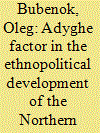

|
|
|
|
|
| Summary/Abstract |
The 150th anniversary of the end of the Caucasian War, which caused havoc in the lives of the Circassians, coincided with the 2014 Winter Olympics in Sochi organized on the land where Circassians (Adyghes) had long lived. These two events revived an interest in the Circassian question and showed that the lacunae in the history of the Adyghes, making an unbiased approach to the issue, impossible should be filled with facts. Repatriation of the Circassians to the Caucasus and a unified Adyghe republic are impossible in Russia’s political reality.
|
|
|
|
|
|
|
|
|
|
|
|
|
|
|
|
| 2 |
ID:
140762
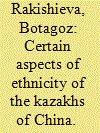

|
|
|
|
|
| Summary/Abstract |
There are about 5 million Kazakhs living all over the world outside the Republic of Kazakhstan, the largest part of them predictably found in the Xinjiang-Uyghur Autonomous Region of the PRC bordering on Kazakhstan
|
|
|
|
|
|
|
|
|
|
|
|
|
|
|
|
| 3 |
ID:
140759
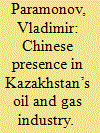

|
|
|
|
|
| Summary/Abstract |
China’s presence in Kazakhstan’s oil and gas industry shows that it is primarily interested in developing this country’s hydrocarbon fields. Raising the production volumes of Kazakhstan’s hydrocarbons will make it possible for China to meet its own energy needs. Chinese companies presently control approximately one quarter of the oil produced in Kazakhstan and one fifth of its petroleum product market. They also occupy a relatively strong niche in such an important segment of Kazakhstan’s oil and gas industry as the construction and exploitation of oil and gas pipelines. In the short and medium term, the nature and scope of China’s presence in Kazakhstan’s oil and gas industry is unlikely to significantly change. In the long term, much will depend on whether Chinese companies gain access to “big oil” and, correspondingly, “big gas” after developing offshore deposits, primarily within the framework of the North Caspian project.
|
|
|
|
|
|
|
|
|
|
|
|
|
|
|
|
| 4 |
ID:
140760
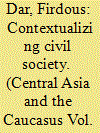

|
|
|
|
|
| Summary/Abstract |
The idea of “civil society” has achieved prominence in political and developmental discourse over the past two decades, particularly in connection with the successive waves of democratization, beginning in Latin America and Eastern Europe and spreading across the developing world. Civil society is an arena where, through free and civilized interaction and communication, individuals obtain and exercise their freedom, as well as pursue their interests. It is a space where people are given an opportunity to enter into social relations free from state interference. The fall of the U.S.S.R. has fundamentally altered the conditions for the emergence of civil society on a global level. The changed political map of Central Asia in general and Kyrgyzstan in particular has made it possible to carry out democratic reforms and, within this political context, various autonomous social organizations have emerged and begun creating their space in the political system. During the past two decades, open political regimes have been providing a more appropriate context within which civil societies are able to thrive. Such systems have provided a legal and regulatory framework guaranteeing the rights of social groups; they permit the existence of lively media, enabling social organizations to communicate their values and programs; and their political elites are acting in ways that reinforce the acceptance of social diversity and political differences. In this context, the present article is an attempt to shed some light on the different models of civil society emerging in the context of Kyrgyzstan.
|
|
|
|
|
|
|
|
|
|
|
|
|
|
|
|
| 5 |
ID:
140751
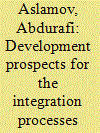

|
|
|
|
|
| Summary/Abstract |
This article examines the Republic of Tajikistan’s participation in regional integration among the Eurasian states. It analyzes the integration experience accumulated during the activity of the Eurasian Economic Community (EurAsEC) and the main obstacles hindering the integration within the framework of the EurAsEC. It focuses on the trends, problems, and prospects for Tajikistan’s possible accession to the Eurasian Economic Union (EEU).
|
|
|
|
|
|
|
|
|
|
|
|
|
|
|
|
| 6 |
ID:
140750
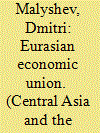

|
|
|
|
|
| Summary/Abstract |
The integration unions that have emerged in the post-Soviet region can guarantee its states preservation of their sovereignty, as well as the opportunity to oppose various internal and external threats, challenges, and risks. Kazakhstan and Russia have become the driving forces behind the integration processes in post-Soviet Eurasia, and these two countries bear the responsibility for maintaining stability in the region.
|
|
|
|
|
|
|
|
|
|
|
|
|
|
|
|
| 7 |
ID:
140756


|
|
|
|
|
| Summary/Abstract |
After unifying with Crimea in 2014, Russia became determined to build a traffic interchange across the Kerch Strait. A bridge across the strait has appeared and disappeared from the agenda several times. Today Moscow means business: the peninsula needs foodstuffs, energy, and water.
|
|
|
|
|
|
|
|
|
|
|
|
|
|
|
|
| 8 |
ID:
140757


|
|
|
|
|
| Summary/Abstract |
This article analyzes the changes in the amount and structure of budget spending in Azerbaijan’s economy in 2000-2013. It assesses the impact of budget spending on the dynamics of the economy’s non-oil sector, personal income, employment, poverty, inflation, import, and human development indicators. On the basis of the calculations carried out, it establishes that even if the multiplier of hypothetic spending in the country’s economy is equal to 2.6, the multiplication effect of budget spending amounts to 1.4 in the non-oil sector and 1.8 in personal income, respectively. In addition, a 1% increase in budget spending in real terms leads to a real increase of 0.47% in the non-oil sector and of 0.56% in personal income. Every billion manats of budget spending creates 28,000 new jobs and releases approximately 190-200,000 people from the grips of poverty. At the same time, an abrupt increase in budget spending will stoke inflation and cause an increase in import: a rise in budget spending by 10% increases inflation by 2.1% and import volume by 6.1%.
|
|
|
|
|
|
|
|
|
|
|
|
|
|
|
|
| 9 |
ID:
140753


|
|
|
|
|
| Summary/Abstract |
The author analyzes a highly specific geopolitical phenomenon—geopolitical self-identification of the Central Asian countries with the help of geographic images, symbols, and signs used to prove their importance on the international arena and at the regional level in particular. In his analysis the author uses a constructivist approach to the efforts to fit several geographic descriptions into a geopolitical context combined, to a certain extent, with a realistic approach expressed by the term “geopolitical semiotics.”
|
|
|
|
|
|
|
|
|
|
|
|
|
|
|
|
| 10 |
ID:
140752
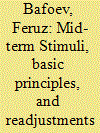

|
|
|
|
|
| Summary/Abstract |
The United States is kept busy by the events unfolding worldwide and on the Eurasian continent (the Ukrainian crisis, Afghanistan, the anti-Russian sanctions, oil and gas prices, the Muhammad cartoons crisis, the Lausanne talks on the Iranian nuclear file, etc.). Under the pressure of these and many other factors, Washington is actively readjusting its Central Asian policy, as well as its conceptual approaches to the regional policies of other players and to the changing specifics of each of the Central Asian countries.
|
|
|
|
|
|
|
|
|
|
|
|
|
|
|
|
| 11 |
ID:
140764
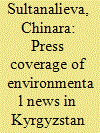

|
|
|
|
|
| Summary/Abstract |
This article explores obstacles and conditions that environmental nongovernmental organizations face in interacting with media outlets in Kyrgyzstan. It also examines the limited scope of environmental journalism and the resulting limited ability of news outlets and eco-NGOs to help set the public agenda for discussion of policy and issues in the country. Even if such public relations interaction occurs, it is rarely effective and rarely generates influential eco/environmental articles in the media. The study is based on a content analysis of the news agency 24.kg and the newspaper Vecherniy Bishkek. It includes results of a survey and interviews with eco-NGOs representatives.
|
|
|
|
|
|
|
|
|
|
|
|
|
|
|
|
| 12 |
ID:
140761
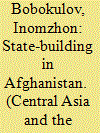

|
|
|
|
|
| Summary/Abstract |
It appears that the multinational and multiconfessional nature of Afghan society itself is the main reason prompting examination of the problem raised in this article. Recently, there has been increasingly lively discussion about whether Afghanistan will be able to choose a development model that could ensure long-term peace and stability in the “heart of Asia.”
|
|
|
|
|
|
|
|
|
|
|
|
|
|
|
|
| 13 |
ID:
140755
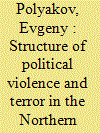

|
|
|
|
|
| Summary/Abstract |
The author relies on the structural violence concept to analyze political violence and terror in the Northern Caucasus throughout the 1990s-2000s, which brought him to the conclusion that direct armed violence, or even terror, are less dangerous than structural violence. The dynamics of their manifestations, however, is interconnected.
|
|
|
|
|
|
|
|
|
|
|
|
|
|
|
|
|
|
|
|
|